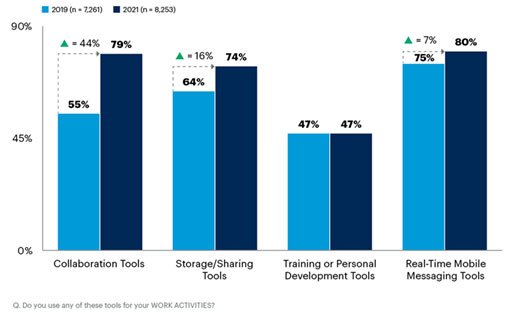Nearly 80 percent of workers are using collaboration tools for work in 2021, up from just over half of workers in 2019, according to the Gartner Digital Worker Experience Survey. This is an increase of 44 percent since the pandemic began.
“Collaboration tools found renewed importance during Covid-19 for their role in ensuring the productivity of suddenly remote teams,” said Christopher Trueman, Principal Research Analyst, Gartner. “As many organizations shift to a long-term hybrid workforce model, cloud-based, personal and team productivity technologies, along with collaboration tools, will form the core of a series of new work hubs that meet the requirements of various remote and hybrid workers.”
Storage/sharing and real-time mobile messaging tools also saw increased use during the pandemic, used by 74 percent and 80 percent of 2021 respondents, respectively.
Changes in Digital Workplace Technology Use, 2019-2021 (Percentage of Respondents)

Source: Gartner (August 2021)
Specifically, the use of meeting solutions surged during the pandemic. While workers globally reported that they spent, on average, 63 percent of their meeting time in-person in 2019, which dropped to 33 percent by 2021 as more meetings took place over audio and video-enabled meeting solutions. The shift away from in-person meetings is expected to continue. Gartner predicts that by 2024, in-person meetings will drop from 60 percent of enterprise meetings to 25 percent, driven by remote work and changing workforce demographics.
“As IT leaders prepare for a mix of meeting modalities, it will be critical that they ensure equitable collaboration, tool and resource access for all meeting participants, regardless of location,” said Trueman. “Cloud-based meeting solutions and content service platforms can support this through offerings or integrations with technologies including virtual whiteboards, rich chat features, and recording and transcription capabilities.”






















